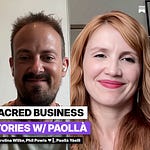Dan Roitman started his first company from a college dorm room and grew it to $100 million over 15 years. This conversation might feel different from our usual Sacred Business episodes. Dan speaks the language of metrics, optimization, and traditional business strategy. And that’s exactly why this matters.
If you’re someone who typically flows with intuition and resists “business talk,” I invite you to listen with fresh ears and an open heart. See what’s here for you. Take only what’s useful. Because hidden inside this very practical approach are lessons that could unlock something you’ve been avoiding.
Dan is someone I truly see as a business genius. After two mastermind retreats with him, I would take any opportunity to pick his brain. This conversation offers you that same chance.
Show Notes
[00:03:00] - Getting Started: The Power of Taking Risks Young
Dan talks about starting entrepreneurial ventures as a kid, from mowing lawns to selling candy at school. His perspective on timing: take your biggest risks when you’re young and have less to lose. Most people don’t do this, even though it’s when you can afford the maximum risk.
• The “kitchen table business” approach works well when you have responsibilities and need low-risk options
• Starting aggressive ventures in your early twenties makes more sense than waiting until you have a family and mortgage
• Your entrepreneurial instinct usually shows up early, even if you don’t recognize it as that at the time
[00:06:15] - The Unexpected Path: From Music to Business
Dan earned a full scholarship for jazz commercial composition after teaching himself guitar and practicing 2-3 hours daily, eventually scaling up to 6 hours a day. But two years into music school, he realized music was becoming mechanical and he didn’t want to be a starving musician.
• He studied music while simultaneously taking business courses, keeping his options open
• The realization that he could apply creativity to business became a turning point
• Sometimes your talents point you toward a path, but your goals take you somewhere else
[00:15:45] - The Thousand Day Rule: Your New Business Timeline
This might be the single most valuable framework Dan shares in the entire conversation. If you’re starting a new venture, planning to launch something, or wondering why your business isn’t “there” yet, this will change how you think about time.
The thousand day rule is simple: be willing to invest a thousand days into a new business before expecting major results. That’s roughly three years. Not three months. Not even one year. Three full years of showing up, figuring things out, iterating, learning.
• Most people quit long before the thousand days are up because their timeline expectations are completely unrealistic
• This isn’t about working harder for three years - it’s about giving yourself permission to learn, adjust, and grow without the pressure of immediate massive success
• Some things genuinely take time to figure out, especially around advertising and finding what actually works for your specific business
• The alternative “hundred day rule” applies when you’re joining an existing business - you need a clear plan to add value within that first hundred days
Why this matters: Dan spent two years trying to figure out display advertising for his first company - they were already successful, but it still took two years to crack that specific channel. Once they figured it out, they could suddenly spend $1-2 million per month on it profitably. But it took two years of persistent effort.
The thousand day rule removes the shame of “not there yet” and replaces it with realistic, sustainable patience. This is the permission you might need to keep going.
[00:28:30] - From Text Scanning Pens to Language Learning Empire
Dan’s first company didn’t start as a clear path. He saw an ad for a text scanning pen while visiting his dad in Europe and realized he’d had that same idea years earlier. He convinced a Swedish professor to fly with him to Sweden to pitch the company, got $10,000 in funding, and launched at University of Maryland.
• The text scanning pen business was going well until the company switched to security applications
• Dan had to pivot and find a new product, landing on professional development products
• About a year later, he discovered language learning and the Pimsleur brand - an amazing audio-based methodology that wasn’t marketed well
• This became the business he scaled to close to $100 million in revenue, making it the #2 language learning brand in the US
• The growth went from $5,000 on a credit card for an advertising buy to eventually $3 million a month in media spend
[00:35:20] - Where Confidence Really Comes From
Dan’s approach to business is grounded in solving real problems and measuring what works. His confidence didn’t come from belief or manifestation - it came from creating something that actually worked and seeing the results.
• He built his tutoring company because he needed it himself - that gave him certainty it solved a real problem
• Early validation came from students using the platform and getting results
• This practical, metrics-driven approach might feel uncomfortable if you’re used to more intuitive business building - but there’s wisdom here about testing and proving your concept
[00:42:15] - Teaching Kids What School Won’t: The Miller Moguls Series
After selling his company, Dan wrote a children’s book series teaching 8-14 year olds about entrepreneurship and financial literacy. The books follow three siblings who lose their allowance and have to learn how to create value.
• The series currently has six books available, with six more coming soon
• Each book teaches different business principles through story and struggle
• Dan self-published to maintain control over the message and approach
[00:48:30] - Tax Optimization for High Earners
Beyond the books, Dan now leads a tax optimization firm helping US entrepreneurs earning $500K+ save up to 40% on taxes (typically $150K per million dollars of EBITDA).
• This service specifically targets American citizens with established businesses
• The focus is on legal strategies that most entrepreneurs don’t know exist
• Financial optimization matters, but it’s not the whole story
Key Quotes
“If somebody’s looking to get into business, the best thing to possibly do is just to get started. The question is just how you start.” - Dan Roitman
“Some things just take time to figure out. You just got to be willing to invest a thousand days into a new business and know that it could be a thousand days of figuring things out.” - Dan Roitman
“When you’re younger, it’s better to take more aggressive risks. If you have no family, no kids - you’re probably at the age where you can take the maximum risk. Most people actually don’t do that.” - Dan Roitman
Resources Mentioned
Miller Moguls Book Series
Website: millermoguls.com
Six books currently available teaching kids entrepreneurship and financial literacy
Target age: 8-14 years old
Jarvis Morris Tax Optimization
Website: jarvismorris.com
For US entrepreneurs earning $500K+ annually
Potential savings: Up to 40% on taxes
Boundless Life
Travel school program mentioned for families wanting to explore world-schooling options
What Makes This Conversation Different
This episode of Sacred Business Stories might not sound like your typical Sacred Business conversation. Dan speaks in numbers, metrics, and traditional business strategy. There’s no talk of frequencies, inner work, or spiritual principles here.
And that’s exactly why it matters.
If you felt resistance while listening, that resistance is information. If the practical, optimization-focused approach felt uncomfortable, that discomfort is showing you something. The work isn’t to become more like Dan - it’s to take what’s useful from his approach and integrate it with your own truth.
The thousand day rule? That’s universal wisdom dressed in business language. The idea of taking maximum risk when you’re young? That’s about listening to your life’s timing. Building something that solves a real problem? That’s about being of service.
Dan is a business genius who’s built something real and lasting. His approach works. The question is: what parts of this wisdom are you ready to receive?
Ready to explore how structure and essence can work together in your business?
We support entrepreneurs in addressing both the patterns that keep them stuck AND building the complete business roadmap to move forward. This isn’t about choosing between intuitive flow and practical strategy. It’s about recognizing you need both.
Book your Harmony Map Integration Call where we’ll map your unique frequency patterns and create a clear path forward for both your personal evolution and your business growth.
Thank you for being part of the Sacred Business community. These conversations happen because you show up, because you’re willing to question the typical entrepreneurial path, and because you know there’s a better way to build.
P.S. This conversation is available as a replay on our Substack. Watch the full 59-minute discussion to hear Dan’s complete story and the nuances that didn’t make it into this recap.
What’s Next: Join us every week for Sacred Business Stories where we have honest conversations with entrepreneurs who are building businesses aligned with their deepest truth. Subscribe on Substack to never miss an episode.













